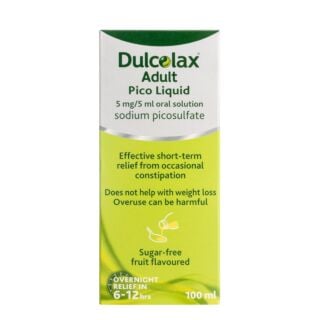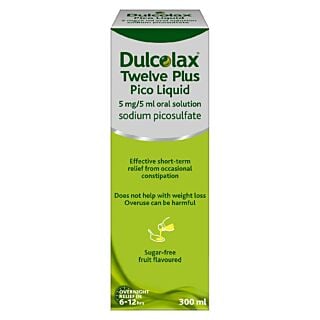Why has buying stimulant laxatives become more restricted?
Explaining the changes in stimulant laxative availability
Have you been a bit blocked up lately?
If you have then you may have noticed that the laxatives you usually buy aren’t available on the shelves of your supermarket or corner shop any more, and are only available in smaller packs.
This is because of new regulations which have been put in place to help manage the use of stimulant laxatives in an effort to reduce laxative abuse or overuse.
So why is this a problem? Read on to learn what stimulant laxatives are and why these regulations have been put into place.

What are stimulant laxatives?
Stimulant laxatives are a type of medication that helps to ease your constipation.
They work by stimulating the muscles in your bowel, helping them to push stubbornly stuck poo through your system so you can pass it normally.
Stimulant laxatives normally take around 6 - 12 hours to work, so you’ll take them before bed to encourage a bowel movement the following morning.
Not all laxatives are stimulants, so if you’re looking for this type of laxative you’ll want to pick up a product that includes one of the following active ingredients:
- Bisacodyl
- Senna
- Sodium picosulfate
What is constipation?
Constipation is a common condition that you’ll likely experience at one point or another.
When you’re constipated it means that you can’t poo, and when you do finally poo you’ll find it larger, harder, or more difficult to push out than usual.
Constipation will normally go away on its own in time, but as it can be quite uncomfortable you may want to consider using a laxative to help move things along.

Why has the number of stimulant laxatives I can buy at a time been changed?
The number of stimulant laxatives you can buy at a time has been changed following a national safety review.
This review has found that although stimulant laxatives are commonly used and generally safe when used correctly, they run the risk of being overused or used improperly.
This has been found to be a particular risk in those who have an eating disorder, who often abuse laxatives because they think it can help them to lose weight.
Taking too many laxatives or using laxatives incorrectly can be very dangerous, and even fatal in some cases, which is why the government has decided to enforce stricter restrictions on the sale of large amounts of stimulant laxatives.
This doesn’t mean that you can’t buy them at all, you’ll just need to buy a smaller pack or speak to your pharmacist for a larger pack.
Can laxatives be used to help me lose weight?
Laxatives of any sort, including stimulant laxatives, should not be used to help you to lose weight.
There is no evidence that they actually help you to lose weight at all, and abusing laxatives can lead to long term health problems and can even be fatal in some cases.
People often mistakenly believe that laxatives help them to lose weight by stopping the calories from your food from entering into your system, but this just isn’t true.
Laxatives don’t stop your digestive system from processing your food, they just move waste and water from your system.
When you lose waste and water after taking a laxative, you may weigh less when you step on the scales or feel like you have a flatter stomach, but this is often due to dehydration rather than any genuine weight loss.
As well as their inability to help you lose weight, laxatives can make you very unwell when you abuse them, and we would never, ever recommend taking more laxatives than you should.

What is an eating disorder?
Eating disorders are mental health conditions that affect the way you eat and the way you think about food.
An eating disorder can cause weight gain or severe weight loss and can make you ill over time as your body suffers from malnutrition.
People with eating disorders can often see their bodies in a distorted way, for example, thinking they’re fat when they’re actually underweight.
There are 3 main types of eating disorder;
- Anorexia: Causes severe weight loss as you restrict the foods you eat, sometimes accompanying this with too much exercise. People with anorexia usually aim to be at a very low weight, lower than what is considered to be a healthy BMI and have a fear of weight gain.
- Binge Eating Disorder: When you have binge eating disorder you’ll usually eat large amounts of food in a short time, even continuing when you feel full. These binges will usually happen secretly and may be accompanied by feelings of guilt or depression. Some people with this condition may buy special foods to eat during binges and may steadily gain weight as their condition continues.
- Bulimia: People with bulimia will often go through phases where they eat a lot of food (binging), followed by making themselves sick or using laxatives (purging) to try and stop them from gaining weight. People with bulimia will often try to keep their binging and purging phases a secret, and it can be difficult for others to notice their condition.

Where can I get support and help if I think I have an eating disorder?
It’s important to get help for an eating disorder as soon as you can and your first port of call should always be your GP.
They’ll be able to monitor your overall health and offer any treatment you need before referring you to eating disorder specialists who can help you to manage your mental health.
For extra support, you may consider contacting a charity like Beat, which provides a range of services that can help you throughout your recovery.
These services include helplines, support groups, and peer coaching as well as a wealth of information and resources at your fingertips.

Are there home remedies I can use for constipation?
There are some lifestyle changes you can make to help ease or prevent constipation.
For starters, make sure you drink enough water and get enough fibre in your diet.
These will both help to make your poo softer and easier to pass.
Try to stay in a routine when it comes to your toilet time, changes in your lifestyle or routine can have a hand in your constipation.
Don’t ignore the urge to poo and take your time when it’s time to go, rushing it won’t help! You should also try to get some exercise, if you don’t already, as it can help to get your system moving.
When should I see a doctor?
If you’re concerned about constipation or think you may have an eating disorder then we’d recommend going to see your doctor so they can offer you help, advice and treatment.
There are a few times when we’d definitely recommend a trip to your GP, so let’s take a look at each condition and when an appointment would be necessary.
Constipation
We recommend making an appointment with your GP if you find that you’re regularly constipated, or if your constipation lasts for a long time.
We’d also recommend seeing your doctor if you have blood in your poo or feel very tired or bloated for a long time.
If other medications haven’t helped to ease your constipation, ask your doctor for advice, they may be able to prescribe a more suitable laxative for you.
Eating disorders
If you think you may have an eating disorder then it’s important to get help as soon as possible, as this gives you the best possible chance of recovery in the long run.
Your doctor will ask you some questions regarding your health and your eating habits before checking your weight and potentially ordering a blood test, if necessary.
They’ll then be able to refer you to specialists who can help you to manage your condition.
If you’re worried that someone you know may have an eating disorder, we’d recommend talking to them and getting them to see a doctor if you can.
Your support will mean a lot to them, so try to research their condition and ask them if there’s anything you can do to help them through their recovery.

Now we’ve taken a look at the new regulations around stimulant laxatives and why they’ve been put in place.
Remember, always speak to your pharmacist if you think you need larger amounts of laxatives and they’ll be able to help you to be sure you’re making the right treatment choices.










